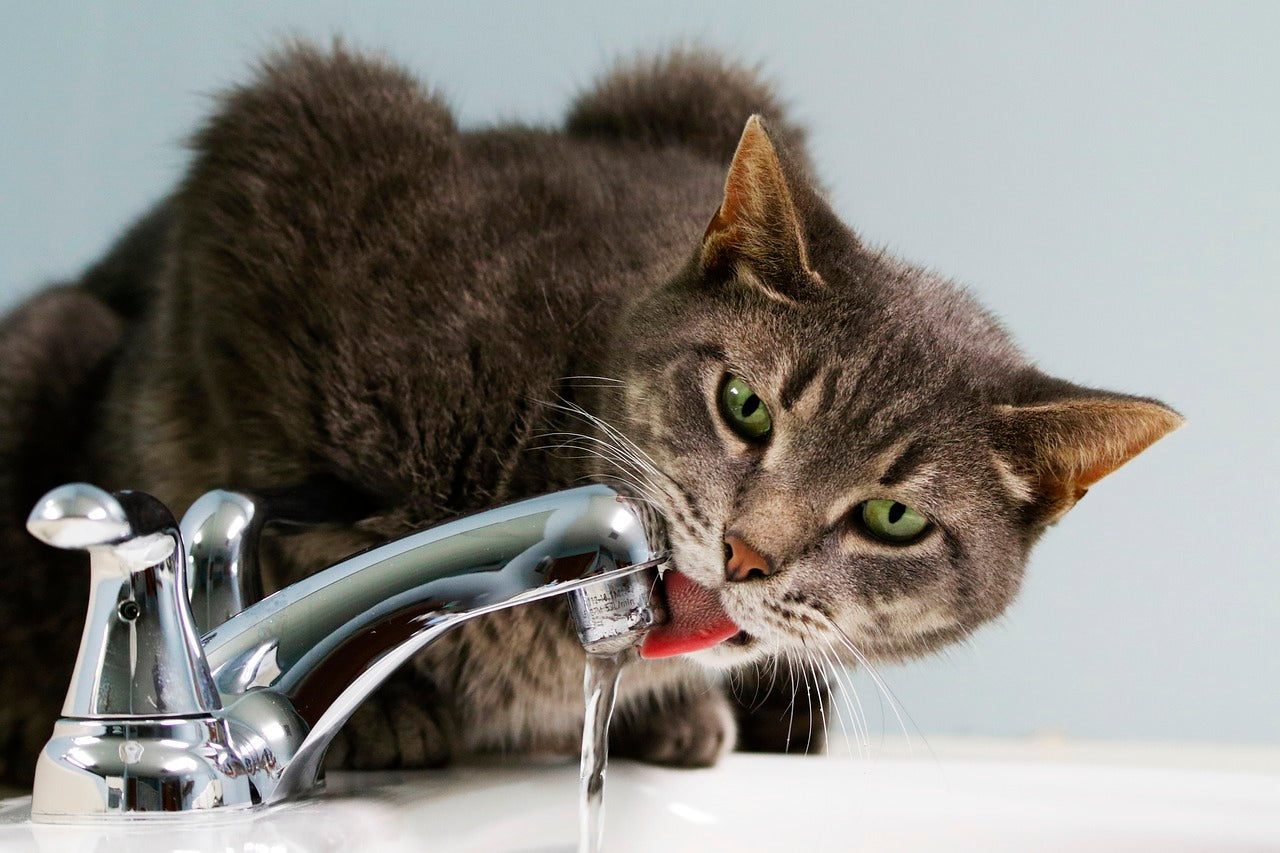We all know that our feline friends hold a special place in our hearts and homes, right? They aren’t just pets; they’re part of the family. That’s why it can be quite concerning when they start exhibiting any unusual behaviour.
Cats should have constant access to clean and fresh water, but when your pet is drinking in excess, it can be hard to know what to do next. If your cat is drinking more water than usual, you might be wondering if they’re unwell, so we’re here to put your mind at ease and offer some simple solutions.
How much should my cat drink?
First things first – let’s establish what’s normal when it comes to your cat’s water consumption. Just like us, our furry companions need water to stay healthy. Cats rely on it to keep their bodies functioning optimally, but how much is enough?
The general guideline is that most cats shouldn’t be drinking more than 45ml of water per pound of their body weight a day. Of course, individual cats may have their preferences, and the amount can vary based on factors like diet, activity level and climate.
In warmer weather, your cat might naturally need more water to stay hydrated, and you can always encourage them to drink more with cat water fountains that simulate running water. Remember, every cat is unique, so it’s crucial to pay attention to your cat’s specific needs.
Should I be worried if my cat is drinking a lot of water?
Now, you might be thinking, “Why is my cat drinking so much water? Should I be concerned?”
Well, excessive thirst in cats can be a sign of an underlying issue. However, it’s essential not to jump to conclusions immediately. Sometimes, factors like a change in diet, warmer weather or increased physical activity can lead to an uptake in water consumption. These are all harmless reasons, and there’s no need to worry. Your kitty may just be a bit parched or looking for a way to cool off.
But, if your cat’s drinking behaviour has changed dramatically or is accompanied by other unusual behaviour or signs of illness (loss of appetite or weight, sickness, lethargy), we recommend contacting your vet. It’s best to contact your vet as soon as you notice a change to seek further advice so that any underlying issues are detected and treated early enough to prevent any further problems.
Is your cat drinking a lot of water and meowing?
A cat that suddenly starts drinking more water than usual and meowing excessively may be showing signs of diabetes. Diabetes can affect cats, just like it does humans, and can lead to increased thirst and frequent urination, which might mean that your moggy becomes more vocal. These are also potential signs of hyperthyroidism, a common condition in older cats.
If you notice these signs, we suggest contacting your vet for a thorough evaluation.
Is your old cat drinking a lot of water and losing weight?
If your senior cat is hitting the water bowl more often and losing weight, this could be a sign of diabetes, but it might also be a sign of hyperthyroidism.
Hyperthyroidism causes an overproduction of thyroid hormones, leading to increased thirst, weight loss and other symptoms like restlessness and increased heart rate. But don’t worry, hyperthyroidism is treatable – but it’s essential to have your senior feline checked by the vet for proper diagnosis and treatment.
If your old cat is losing weight, you could also consider ways to encourage your cat to eat more. A key way to do this is to remain consistent in their feeding environment, types of food, feeding schedule and feeding method. To help with this, automatic cat feeders are a useful way to keep your cat fed on a regular schedule.
When to visit your vet
After noticing a change in behaviour in your cat, keep an eye out for other symptoms and see if the behaviour persists or changes. Your cat’s health is a top priority, so if you’re concerned about their increased water intake or any other unusual behaviour, it’s always a good idea to consult with your vet for an accurate diagnosis and receive early treatment that could make a big difference.
Here are some key signs that indicate it might be time to schedule a vet appointment:
-
Prolonged, unexplained increase in water consumption: If your cat has been guzzling water for more than a few days without an apparent cause, consult your vet.
-
Changes in urination: Keep an eye on your cat’s litter box habits. If they are using the litter box more frequently or displaying any signs of discomfort during urination, it’s time for a check-up.
-
Weight loss: Unexplained weight loss, especially in combination with increased thirst, can be a red flag. Get your cat examined promptly.
-
Change in behaviour: If your cat’s behaviour has altered significantly, such as being more lethargic or irritable, it’s a sign that something might be amiss, and it’s worth getting them checked out with a trip to the vet.
Products to Keep Your Cat Happy and Healthy at Closer Pets
We hope our guide has helped to answer why your cat may be drinking so much water. As we’ve said above, there may be a few reasons why your furry friend is drinking more than usual, and it may not be cause for concern. However, if you see a significant change in their drinking habits paired with other unusual behaviour, there’s a chance there could be an underlying health condition, so you’re best getting further advice from a vet.
At Closer Pets, we have many useful cat products that can help improve your cat’s lifestyle, with cat water fountains and automatic cat feeders available to make your cat’s diet and drinking both easy to manage and consistent.
If you have any questions about the products we offer and how they can help, get in touch with our team today, and we’ll be more than happy to lend a helping paw!

